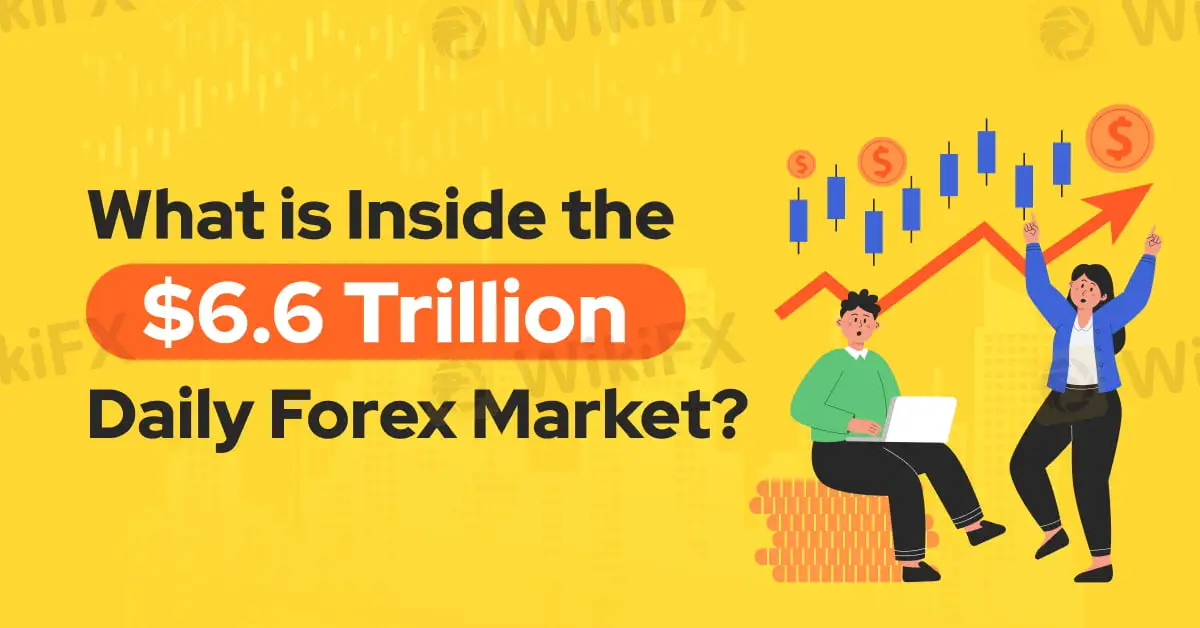简体中文
繁體中文
English
Pусский
日本語
ภาษาไทย
Tiếng Việt
Bahasa Indonesia
Español
हिन्दी
Filippiiniläinen
Français
Deutsch
Português
Türkçe
한국어
العربية
What is Inside the $6.6 Trillion Daily Forex Market?
Abstract:This article explores the vast influence of the $6.6 trillion foreign exchange market, its role in global trade, the impact of the floating exchange rate system, and the key players shaping currency values.

The foreign exchange (forex) market stands as one of the most influential and dynamic financial markets in the world. With a staggering daily trading volume of approximately $6.6 trillion, the forex market dwarfs the combined trading volumes of major global stock exchanges. This immense market size reflects the critical role forex plays in global economics, where currency exchange is integral to international trade, investment, and economic policy.
The growth of global trade, driven by the principle of comparative advantage, has necessitated the development of a robust and fluid foreign exchange market. Comparative advantage enables countries to specialize in the production of goods they can produce most efficiently, leading to a thriving international trade network. As goods and services flow across borders, so too does the need for currency exchange, reinforcing the importance of the forex market in the global economy.

The evolution of the forex market can be traced back to the collapse of the Bretton Woods system in the 1970s. Under Bretton Woods, currencies were pegged to the US dollar, which in turn was tied to gold. The system's collapse led to the adoption of floating exchange rates, where currencies are traded freely on the open market, much like commodities. This shift significantly increased the influence and volatility of the forex market, as currencies began to fluctuate based on supply and demand dynamics.
Key players in the forex market include businesses, investors, and governments, each with distinct motivations and strategies. Businesses engage in forex trading to support their international operations, such as opening new stores abroad or paying suppliers in different currencies. Investors, on the other hand, use forex to hedge against currency risks or to speculate on exchange rate movements, often employing financial instruments like derivatives to maximize profits. Governments also play a crucial role in the forex market, often manipulating their currencies to achieve economic objectives. For instance, China has been known to devalue its currency to make its exports more competitive on the global stage.
Despite the forex market's importance, the intrinsic value of currencies remains a complex and often debated topic. Unlike tangible goods, currencies, shares, and derivatives lack intrinsic value; their worth is determined by market perception and what others are willing to exchange for them. This concept is exemplified by the British Pound, which remains one of the most valuable currencies globally, largely due to historical factors rather than solid economic foundations.
In essence, the forex market's vast scale, influence, and complexity underscore its pivotal role in the global economy. It facilitates international trade, supports investment strategies, and allows governments to pursue economic policies, all while operating in a landscape where the value of currencies is determined by perception rather than intrinsic worth.

Disclaimer:
The views in this article only represent the author's personal views, and do not constitute investment advice on this platform. This platform does not guarantee the accuracy, completeness and timeliness of the information in the article, and will not be liable for any loss caused by the use of or reliance on the information in the article.
Read more

Webull and Others Fined $275,000 for Incomplete Suspicious Activity Reports
Webull Financial, alongside Lightspeed Financial Services Group and Paulson Investment Company, LLC, has agreed to pay a collective fine of $275,000 following an investigation by the US Securities and Exchange Commission (SEC). The penalty was issued due to the firms’ failure to include essential information in suspicious activity reports (SARs) over a four-year period.

Barclays Resolves £40M Fine Over 2008 Fundraising Disclosure Failures
Barclays has reached a settlement with the UK’s Financial Conduct Authority (FCA), agreeing to pay a £40 million fine for failing to adequately disclose arrangements with Qatari investors during its critical fundraising efforts amidst the 2008 financial crisis.

WikiEXPO Global Expert Interview: Advanced Practices and Insights in Financial Regulation
In the midst of rapid advancements and evolving landscapes in financial technology, financial regulation, and ensuring financial security, WikiGlobal stands at the forefront, closely tracking these transformative trends. As we embark on our series of exclusive interviews focusing on these pivotal areas, we are delighted to have had an in-depth conversation with.

Alleged Concerns with TradeEU.global's Trading Practices
An individual trader has come forward with allegations of an unfavourable experience while using the services of the broker TradeEU.global.
WikiFX Broker
Latest News
Saxo & Portuguese Bank Partnership
SEC Fines Broker-Dealers $275K for Incomplete SAR Filings
Elon Musk Warns of Imminent US Bankruptcy | Bitcoin Retreats from $100K
WikiEXPO Global Expert Interview: Advanced Practices and Insights in Financial Regulation
Justin Sun Invests $30M in Trump-Backed World Liberty Financial
Kraken Closes NFT Marketplace Amid New Product Focus
Lured by False Promises: Malaysian Driver Lost RM218K to an Investment Scam
FTX Sets March 2025 Timeline for Creditor Payouts: What It Means for Investors
What is an Economic Calendar? How it works
Pros & Cons of Automated Forex Trading
Currency Calculator



